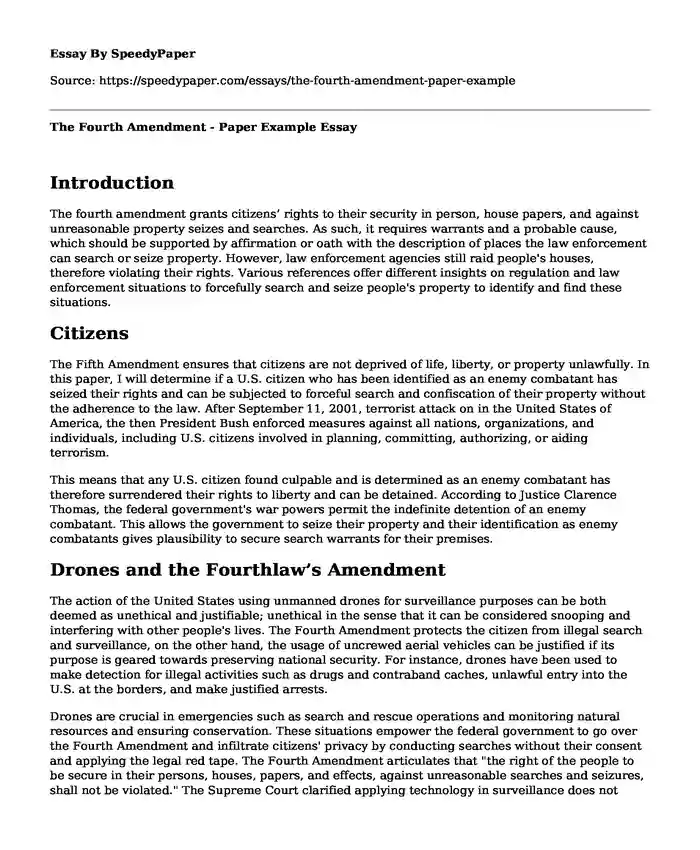
| Type of paper: | Essay |
| Categories: | History Constitution |
| Pages: | 3 |
| Wordcount: | 721 words |
Introduction
The fourth amendment grants citizens’ rights to their security in person, house papers, and against unreasonable property seizes and searches. As such, it requires warrants and a probable cause, which should be supported by affirmation or oath with the description of places the law enforcement can search or seize property. However, law enforcement agencies still raid people's houses, therefore violating their rights. Various references offer different insights on regulation and law enforcement situations to forcefully search and seize people's property to identify and find these situations.
Citizens
The Fifth Amendment ensures that citizens are not deprived of life, liberty, or property unlawfully. In this paper, I will determine if a U.S. citizen who has been identified as an enemy combatant has seized their rights and can be subjected to forceful search and confiscation of their property without the adherence to the law. After September 11, 2001, terrorist attack on in the United States of America, the then President Bush enforced measures against all nations, organizations, and individuals, including U.S. citizens involved in planning, committing, authorizing, or aiding terrorism.
This means that any U.S. citizen found culpable and is determined as an enemy combatant has therefore surrendered their rights to liberty and can be detained. According to Justice Clarence Thomas, the federal government's war powers permit the indefinite detention of an enemy combatant. This allows the government to seize their property and their identification as enemy combatants gives plausibility to secure search warrants for their premises.
Drones and the Fourthlaw’s Amendment
The action of the United States using unmanned drones for surveillance purposes can be both deemed as unethical and justifiable; unethical in the sense that it can be considered snooping and interfering with other people's lives. The Fourth Amendment protects the citizen from illegal search and surveillance, on the other hand, the usage of uncrewed aerial vehicles can be justified if its purpose is geared towards preserving national security. For instance, drones have been used to make detection for illegal activities such as drugs and contraband caches, unlawful entry into the U.S. at the borders, and make justified arrests.
Drones are crucial in emergencies such as search and rescue operations and monitoring natural resources and ensuring conservation. These situations empower the federal government to go over the Fourth Amendment and infiltrate citizens' privacy by conducting searches without their consent and applying the legal red tape. The Fourth Amendment articulates that "the right of the people to be secure in their persons, houses, papers, and effects, against unreasonable searches and seizures, shall not be violated." The Supreme Court clarified applying technology in surveillance does not violate the Americans' legal privacy rights; thus, the existing aerial surveillance jurisprudence justifies that drone usage constitutes a search within the Fourth Amendment.
Legal Authorities
The President of The United States is constitutionally mandated to participate in electronic surveillance with or without judicial oversight or the approval of Congress. It does not violate regulations since it is a reflex to the 9/11 terror attack. This presents a problematic precedent towards undermining the Fourth Amendment protects the people against unlawful wiretapping or surveillance without a warrant. It is more challenging because such power can easily be abused as it occurred in 1975 in the President Nixon regime.
However, after the congressional determination in 1978 that formulated the FISA (Foreign Intelligence Surveillance Act), issues warrant under exceptional circumstances to wade off acts of sabotage, treason, and international terrorism within or outside the country. This presents an ethical dilemma to the president on the moral and legality of electronic surveillance. Still, when it needs to be done for the safety of the citizens, then the president will have unregulated access to spy on targets without judicial oversight.
Conclusion
On the other hand, the fourth amendment provides legal searches for a police officer to access an individual's premises. They must present a search warrant to execute an investigation and an arrest. But the police use trickery under the guise of probable cause to enter person premises and conduct questioning without exposing that they are conducting an investigation. In the end, the suspect will volunteer information without legal counsel and have his/her place ransacked without a warrant, and when they will be presented in court, all the information they gave freely will be used against them.
Cite this page
The Fourth Amendment - Paper Example. (2023, Dec 12). Retrieved from https://speedypaper.com/essays/the-fourth-amendment-paper-example
Request Removal
If you are the original author of this essay and no longer wish to have it published on the SpeedyPaper website, please click below to request its removal:
- Essay Sample on Theodore Roosevelt's New Nationalism vs. Woodrow Wilson's New Freedom
- Essay Example on Legal and Ethical Issue: New York Times Co. v. The United States
- Free Essay Discussing the Ethical Dilemma: Military Vehicle Licensing
- Could a Public Service Sales Tax Create a High-Quality Service for Our Citizens? Free Essay
- Paper Sample. The American Government and Civic Engagement
- Essay Sample on Main Issues That Are Facing California's Prison System
- Free Essay Sample on Foundations of the Development and Functions of Police
Popular categories




